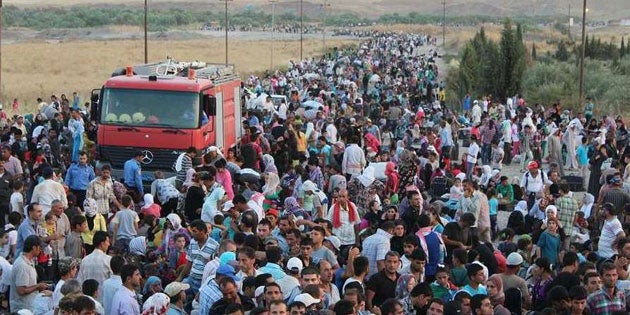One consequence of last month’s tragic terrorist attacks in Paris is that they’ve refocused the world’s attention on Europe’s refugee crisis. Like many people, Max Kovalov – an adjunct professor of political science and international studies at the College – is concerned about this crisis and believes his students are as well. Kovalov refers to the situation in Europe as “the biggest humanitarian crisis faced by the international community since World War II.” This is why he has engaged his students on the topic in both classes he’s been teaching this semester – Model United Nations and European Studies Capstone.
“I feel it’s imperative to educate students about current events, linking them to other historical questions and larger debates about European integration and European identity,” says Kovalov, who grew up in Ukraine.
Kovalov says people can better appreciate the scope of the current refugee crisis by taking into account that between four and five million Syrians have fled their country since 2010, and another seven to eight million are internally displaced, which means they aren’t considered refugees by the United Nations because they remain in their home country. By contrast, he says, the wars in Vietnam and Korea produced three and five million refugees, respectively.
Each of the students in Kovalov’s European Studies Capstone course has followed a European country of his or her choice throughout the semester and reported on current events during class. “Given the prominence of the refugee crisis in the news, most of the student reports have touched on this situation and reflected on various policies articulated by European governments as well as the attitudes of ordinary citizens,” he’s says.
In the Model U.N. course, in which students serve as representatives of member states, each one has grappled with the complexities of the refugee crisis, including brainstorming possible solutions.
“They debated the issue and tried to offer practical policy recommendations based upon their respective country’s interests,” he says. “This kind of experiential learning is especially powerful for students because it opens them up to different international and cultural perspectives and encourages them to question their personal views on the problem. It’s really a lot like what’s happening in Europe right now.”
Kovalov says that students in both of his classes have discussed the disparity of public opinion regarding the crisis. “As the crisis endures and the U.S. moves further along in the current national election cycle, I believe we’ll see this issue become a prominent topic of the various campaigns. For students at the College in political science, international studies, sociology and other fields, this is a very important time.”
For additional information on the current refugee crisis, particularly that of Syria, see the United Nations High Commissioner on Refugees data site.






